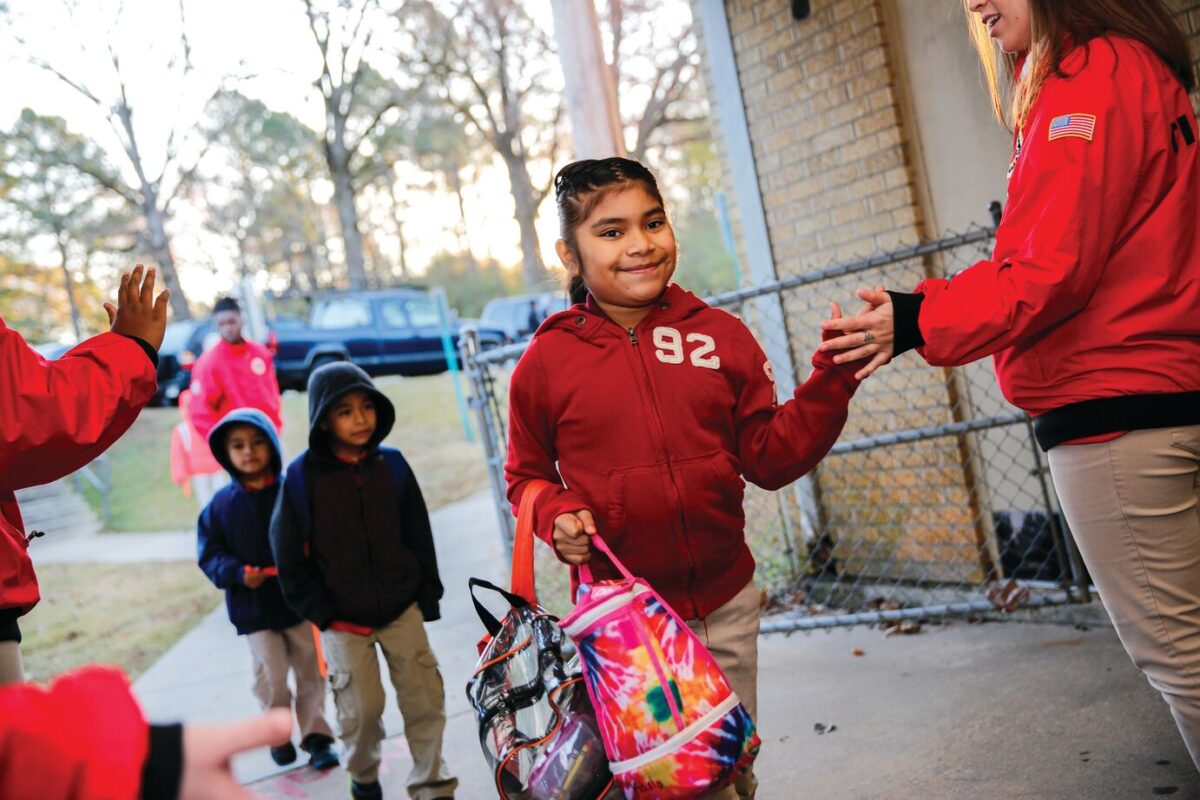Three tips to connect with students this fall

Have you ever felt vulnerable or insecure when walking into a new environment? Especially at the start of a new school year?
Confusion, excitement, and nervousness are just a few emotions that many students feel when they enter a new school for the first time. The rush of overwhelming feelings and information overload about class schedules, locker assignments, and more can keep students from engaging with their peers or enjoying different experiences because they are in an unfamiliar space for the first time.
This anxiety and unease are normal and are often shared by new teachers and other adults who work with students in schools. City Year AmeriCorps members who serve as student success coaches also experience a range of emotions during their pre-service training over the summer and the first few weeks of school, as they adjust to their new AmeriCorps teammates, their partner teacher, and the students they interact with every day.
Student success coaches are near-peer tutors, mentors and role models—young enough to relate to students’ perspectives while mature enough to offer guidance—who receive ongoing training and partner with classroom teachers to provide students with academic, social and emotional support throughout the school day.
Based on my experience serving in Roberto Clemente High School in Chicago, here are three tips to help student success coaches feel better prepared for connecting and working with students during the first few weeks of school:
1. Hang out in the hallway between class periods!
Students will often appreciate you being visible between class periods and will come up to you to chat about life and their day. These small, casual moments are some of the most powerful and real opportunities you will have in your role supporting students.
This often presented an opportunity for student success coaches to get in social and emotional Learning, SEL, coaching in conversations without students realizing that was being done, helping students to feel a sense of belonging in school, grow in their self-confidence, and rebound from setbacks knowing that’s a big part of learning. SEL coaching is important in City Year’s curriculum because students don’t learn as well or as much from people they don’t like.
If students can feel secure and emotionally stable with the adults in their life, they are more likely to perform stronger academically. Students will also observe you in the hallway when you interact with the team and City Year leadership and share their opinions on reaching other challenging students. Students are great resources for asking questions about the school environment, what’s trending, and how many spend their time after school.
As a student success coach, you are able to model what using your voice and sense of agency look like and encourage your students to express and assert their opinion and ideas.
2. Get to know your partner teacher!
This can look different for each pairing, but asking questions when you have 1:1’s, having lunch together, and helping students prepare for daily work can allow space to encourage both sides to relax and open up.
Read about how City Year AmeriCorps members and teachers can work together.
I had a great relationship with my partner teacher; she was considered a “veteran” teacher at the high school. Veteran teachers are considered the go-to person for new teachers to ask questions and be a resource to show others how the school operates. I accompanied my teacher to parent/teacher conferences, various after-school events we were holding, and a few basketball games during the winter.
3. Walk around and get to know students’ names one by one!
In the World Studies classroom I supported, I had about 150 students’ names I needed to remember. Each student was curious why I was in the room and didn’t know what City Year was, so I needed to make sure I wore my uniform to let students know my place in the classroom.
My partner teacher also set strict rules in the classroom and expected me to follow them at all times. This understanding benefited us between class periods if we needed to reset or change how we communicated with students. As the year progressed, students started to develop trust in both of us and grew excited when they passed either of us in the hallways!
These tips can be used for any new experience, too. If you find yourself entering a new environment and feeling anxious, remember you are not the only one feeling these emotions. It’s okay to feel uncomfortable, but that means you are putting yourself in a new position to grow.
Related stories
Because you'll be living on a stipend, it might be a good idea to hold off on that ottoman from...
Read more about Furnishing your apartment on a budget: Tips for AmeriCorps membersCity Year’s “Why We Matter” podcast explores the vital role of education and mentorship in empowering young people. Through interviews...
Read more about Why City Year’s student success coach network mattersRead more and check the City Year blog to learn the soft skills our corps members gain through a year...
Read more about Top five skills employers want you to have todayIf you speak with an alum of an historically Black college or university (HBCU) about their experience, you’ll quickly learn...
Read more about Serving with City Year sharpens job skills, HBCU graduate says















